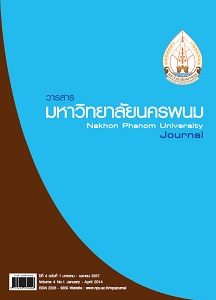การเปรียบเทียบผลสัมฤทธิ์ทางการเรียนวิทยาศาสตร์ เรื่องสารในชีวิตประจำวัน และความสามารถในการคิดวิเคราะห์เชิงวิทยาศาสตร์ ของนักเรียน ชั้นประถมศึกษาปีที่ 6 ระหว่างการจัดการเรียนรู้แบบร่วมมือ โดยใช้เทคนิค STAD กับกระบวนการสืบเสาะหาความรู้
Main Article Content
Abstract
การวิจัยครั้งนี้มีวัตถุประสงค์เพื่อ 1) เปรียบเทียบผลสัมฤทธิ์ทางการเรียน เรื่อง สารในชีวิตประจำวัน ระหว่างนักเรียนที่ได้รับ การจัดการเรียนรู้แบบร่วมมือโดยใช้เทคนิค Student Teams Achievement Divisions (STAD) กับนักเรียนที่ได้รับการจัดการเรียนรู้ โดยใช้กระบวนการสืบเสาะหาความรู้ 2) เปรียบเทียบความสามารถในการคิดวิเคราะห์เชิงวิทยาศาสตร์ ระหว่างนักเรียนที่ได้รับ การจัดการเรียนรู้แบบร่วมมือโดยใช้เทคนิค STAD กับกระบวนการสืบเสาะหาความรู้ 3)ศึกษาความพึงพอใจในการเรียนรู้ของนักเรียน ที่ได้รับการจัดการเรียนรู้แบบร่วมมือโดยใช้เทคนิค STAD และกระบวนการสืบเสาะหาความรู้ กลุ่มตัวอย่างที่ใช้ในการวิจัย เป็นนักเรียน ชั้นประถมศึกษาปีที่ 6 ภาคเรียนที่ 1 ปีการศึกษา 2555 โรงเรียนบ้านสุขเกษม จำนวน 24 คน และโรงเรียนบ้านหนองค้าโคกกุง จำนวน 27 คน สำนักงานเขตพื้นที่การศึกษาประถมศึกษานครพนม เขต 1 โรงเรียนละ 1 ห้องเรียน รวม 51 คน ซึ่งได้มาโดยการเลือกแบบ เจาะจง และสุ่มวิธีการให้กับกลุ่มตัวอย่าง เครื่องมือที่ใช้ในการวิจัย ได้แก่ 1) แบบทดสอบผลสัมฤทธิ์ทางการเรียน ชนิด 4 ตัวเลือก จำนวน 40 ข้อ มีค่าความยาก ตั้งแต่ 0.20-0.58 มีค่าอำนาจจำแนกรายข้อ ตั้งแต่ 0.21-0.75 และค่าความเชื่อมั่นตามวิธีของ Lovett ทั้งฉบับ 0.86 2) แบบทดสอบวัดความสามารถในการคิดวิเคราะห์เชิงวิทยาศาสตร์แบบปรนัย ชนิด 4 ตัวเลือก จำนวน 30 ข้อ มีค่าความยาก ตั้งแต่ 0.20-0.48 ค่าอำนาจจำแนก ตั้งแต่ 0.37-0.70 และค่าความเชื่อมั่น (Kuder-Richardson) ทั้งฉบับ 0.94 3) แบบวัด ความพึงพอใจที่มีต่อการจัดการเรียนรู้แบบร่วมมือโดยใช้เทคนิค STAD กับกระบวนการสืบเสาะหาความรู้ ซึ่งเป็นแบบมาตราส่วน ประมาณค่า 5 ระดับ จำนวน 15 ข้อ มีค่าอำนาจจำแนกตั้งแต่ 0.37-0.67 ค่าความเชื่อมั่นทั้งฉบับ เท่ากับ 0.89 ตามวิธีของครอนบาค สถิติที่ใช้ในการวิเคราะห์ข้อมูล ได้แก่ ร้อยละ ค่าเฉลี่ย ส่วนเบี่ยงเบนมาตรฐาน และการทดสอบสมมติฐาน โดยใช้ t-test (Independent Samples) ผลการวิจัยพบว่า 1) นักเรียนชั้นประถมศึกษาปีที่ 6 ที่เรียนรู้ด้วยกลุ่มร่วมมือแบบ STAD มีผลสัมฤทธิ์ ทางการเรียนสูงกว่านักเรียนที่เรียนรู้ด้วยกระบวนการสืบเสาะหาความรู้ อย่างมีนัยสำคัญทางสถิติที่ระดับ .05 2) นักเรียนชั้นประถม ศึกษาปีที่ 6 ที่เรียนรู้ด้วยกลุ่มร่วมมือแบบ STAD มีความสามารถในการคิดวิเคราะห์เชิงวิทยาศาสตร์สูงกว่านักเรียนที่เรียนรู้ด้วย กระบวนการสืบเสาะหาความรู้ อย่างมีนัยสำคัญทางสถิติที่ระดับ .05 3) นักเรียนชั้นประถมศึกษาปีที่ 6 มีความพึงพอใจต่อการจัด กิจกรรมการเรียนรู้แบบ STAD และกระบวนการสืบเสาะหาความรู้ อยู่ในระดับมากที่สุดและระดับมาก ตามลำดับ
The purposes of this study were: 1) to compare learning achievement on ‘Substances in Daily Life’ of the students whose cooperative learning was managed using the Student Teams Achievement Divisions (STAD) technique versus those whose learning was managed using the Knowledge Inquiry Process, 2) to compare scientific analytical thinking abilities of those students whose cooperative learning was managed using the STAD technique versus those managed using the Knowledge Inquiry Process, and 3) to examine satisfaction of learning among the students whose cooperative learning was managed using the STAD technique versus those managed using the Knowledge Inquiry Process. The samples used were 51 Prathom Suksa 6 students selected by purposive sampling, who were enrolled in the first semester of academic year 2012 comprising 2 classrooms: one with 24 and the other with 27 students selected separately from Ban Sukkasem School and Ban Nong Kha Khok Kung School under the Office of Nakhon Phanom Primary Education Service Area, respectively. The instruments used were: 1) a 40-item learning achievement test with 4 choices, having difficulty values of between 0.20 and 0.58, discrimination power values of between 0.21 and 0.75 and entire reliability value of 0.86 according to the Lovett’s method, a 30-item objective test for measuring ability in scientific analytical thinking with 4 choices, having difficulty values of between 0.20 and 0.48, discrimination power values of between 0.37 and 0.70, and entire reliability value of 0.94 (Kuder Richardson), and 3) a form for assessment of satisfaction with the cooperative learning management using the STAD technique or with the Knowledge Inquiry Process comprising 15 items of which each had a 5-rating scale, whose discrimination power values ranged between 0.37 and 0.67 and entire reliability value according to Cronbach was 0.89. Statistics used to analyze data were percentage, mean, standard deviation and t-test (independent samples). The findings of study were : 1) The Prathom Suksa 6 students who learned through the STAD technique had significantly higher learning achievement than those who learned through the Knowledge Inquiry Process at the .05 level; 2) the former had a significantly higher scientific analytical thinking ability than the latter at the .05 level; and 3) the degrees of students’ satisfaction with learning activity management using the STAD technique and with the Knowledge Inquiry Process were at the highest and high levels respectively.


